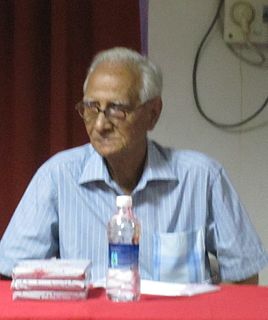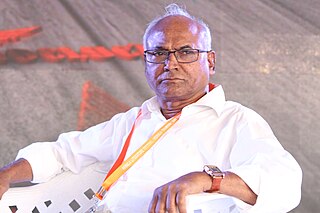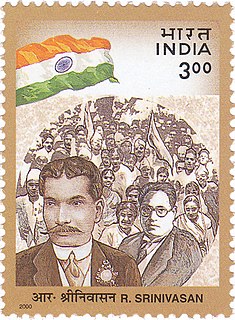
Marathi is an Indo-Aryan language predominantly spoken by Marathi people in the Indian state of Maharashtra. It is the official language of Maharashtra, and a co-official language in Goa and the union territory of Dadra and Nagar Haveli and Daman and Diu. It is one of the 22 scheduled languages of India, with 83 million speakers as of 2011. Marathi ranks 10th in the list of languages with most native speakers in the world. Marathi has the third largest number of native speakers in India, after Hindi and Bengali. The language has some of the oldest literature of all modern Indian languages, dating from around 600 AD. The major dialects of Marathi are Standard Marathi and the Varhadi dialect.

Ashokamitran was the pen name of Jagadisa Thyagarajan, an Indian writer regarded as one of the most influential figures in post-independent Tamil literature. He began his prolific literary career with the prize winning play "Anbin Parisu" and went on to author more than two hundred short stories, and a dozen novellas and novels. A distinguished essayist and critic, he was the editor of the literary journal "Kanaiyaazhi". He has written over 200 short stories, eight novels, some 15 novellas besides other prose writings. Most of his works have also been translated into English and other Indian languages, including Hindi, Malayalam, and Telugu.
Marathi literature is the body of literature of Marathi, an Indo-Aryan language spoken mainly in the Indian state of Maharashtra and written in the Devanagari and Modi script.

Kancha Ilaiah Shepherd is an Indian political theorist, prolific writer and a Dalit rights activist. He writes in both English and Telugu languages. His main domain of study and activism is the annihilation of caste.
Indian English literature (IEL), also referred to as Indian Writing in English (IWE), is the body of work by writers in India who write in the English language and whose native or co-native language could be one of the numerous languages of India. Its early history began with the works of Henry Louis Vivian Derozio and Michael Madhusudan Dutt followed by Rabindranath Tagore and Sri Aurobindo. R. K. Narayan, Mulk Raj Anand and Raja Rao contributed to the growth and popularity of Indian English fiction in the 1930s. It is also associated, in some cases, with the works of members of the Indian diaspora who subsequently compose works in English.

Lankesh Patrike is an Indian vernacular weekly published in Kannada language from Bangalore, Karnataka.

Nabaneeta Dev Sen was an Indian writer and academic. After studying arts and comparative literature, she moved to the USA where she studied further. She returned to India and taught at several universities and institutes as well as serving in various positions in literary institutes. She published more than 80 books in Bengali: poetry, novels, short stories, plays, literary criticism, personal essays, travelogues, humour writing, translations and children's literature. She was awarded the Padma Shri in 2000 and the Sahitya Akademi Award in 1999.
Writers Workshop is a Kolkata-based literary publisher founded by the Indian poet and scholar Purushottama Lal in 1958. It has published many new Indian authors of post-independence urban literature. Many of these authors later became widely known.
Indian English poetry is the oldest form of Indian English literature. Indian poets writing in English have succeeded to nativize or indianize English in order to reveal typical Indian situations. Henry Louis Vivian Derozio is considered the first poet in the lineage of Indian English poetry followed by Rabindranath Tagore, Sri Aurobindo, Sarojini Naidu, Michael Madhusudan Dutt, and Toru Dutt, among others.
Bhatkal & Sen is a publishing partnership between Mandira Sen and Popular Prakashan. The company is based in Kolkata and publishes the imprints Stree and Samya. It is noted for publishing authors such as Kancha Ilaiah, Om Prakash Valmiki, Uma Chakravarti, Gail Omvedt, Manikuntala Sen, Ashok Mitra, V. Geetha, and Bani Basu, and has prominent scholars such as Susie Tharu and Maithreyi Krishnaraj as editors. It publishes academic works in the social sciences, memoirs and classic fiction in translation in English and Bengali.

Sitakant Mahapatra is an Indian poet and literary critic in Odia as well as English. He was in the Indian Administrative Service (IAS) since 1961 until retiring in 1995, and has held ex officio posts such as the Chairman of National Book Trust, New Delhi since then.

Diwan Bahadur Rettamalai Srinivasan (1860–1945), commonly known as R. Srinivasan, was a Scheduled Caste activist and politician from then Madras Presidency of British India. He is a Paraiyar icon and was a close associate of Mahatma Gandhi and was also an associate of B. R. Ambedkar. He is remembered today as one of the pioneers of the Scheduled caste movement in India. He founded the Adi dravida mahajana sabha in 1893.

Ilavenil Meena Kandasamy is an Indian poet, fiction writer, translator and activist from Chennai, Tamil Nadu, India.
Dalit literature is literature written by Dalits about their lives. Dalit literature emerged in the 1960s in the Marathi language, and it soon appeared in Bangla, Hindi, Kannada, Punjabi, sindhi, and Tamil languages, through narratives such as poems, short stories, and autobiographies, which stood out due to their stark portrayal of reality and the Dalit political scene.
Nandini Sahu is an Indian poet and creative writer. She is the Director, School of Foreign Languages and Professor of English at Indira Gandhi National Open University [IGNOU], New Delhi. Her areas of research interest cover Indian Literature, New Literatures, Folklore and Culture Studies, American Literature, Children’s Literature and Critical Theory. She is the Chief Editor/Founder Editor of Interdisciplinary Journal of Literature and Language(IJLL), and Panorama Literaria, both bi-annual peer-reviewed journals in English. She is also professor of English at the Indira Gandhi National Open University, New Delhi, India. She has written several books including poetry in English. Her poetry has been published in India, US, UK, Africa and Pakistan. She has won three gold medals in English literature and also the award of All India Poetry Contest in 1993 at Saint Xavier College, Ranchi and Shiksha Ratna Purashkar. She is also editor in chief of Interdisciplinary Journal of Literature and Language
Vihang A. Naik or Vihang Ashokbhai Naik is a modern bilingual poet from Gujarat, India. He has authored many collections of poetry in English and Gujarati, besides translating from Gujarati into English.

Neerav Patel was a Gujarati and English language poet, translator and editor; primarily known for his contribution in Gujarati Dalit literature such as Burning From Both The Ends, What Did I Do To Be Black and Blue and Bahishkrut Phulo. He edited Swaman, a journal of Dalit writings in Gujarati.

Dalit feminism is a feminist perspective that includes questioning caste and gender roles among the Dalit population and within feminism and the larger women's movement. Dalit women primarily live in South Asia, mainly in Bangladesh, India, Nepal and Pakistan. Dalit women face different challenges than women in higher castes in these countries. They are more likely to be poor, uneducated and socially marginalized. Dalit feminists advocate and have advocated for equal rights for Dalit women based on gender, caste and other issues. They have addressed conferences, created organizations and helped elect other Dalit women into political office.










